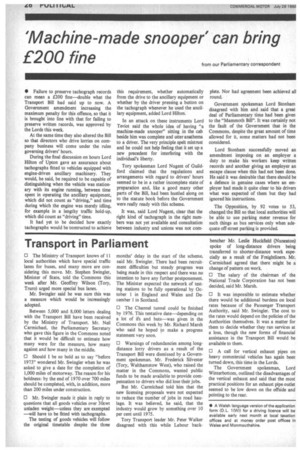'Machine-made snooper' can bring
Page 28

If you've noticed an error in this article please click here to report it so we can fix it.
£200 fine from our Parliamentary correspondent
• Failure to preserve tachograph records can mean a £200 fine—double what the Transport Bill had said up to now. A Government amendment increasing the maximum penalty for this offence, so that it is brought into line with that for failing to preserve written records, was approved by the Lords this week.
At the same time they also altered the Bill so that directors who drive lorries on company business will come under the rules governing drivers' hours.
During the final discussion on hours Lord Hilton of Upton gave an assurance about tachographs fitted to vehicles equipped with engine-driven ancillary machinery. They would, he said, be required to be capable of distinguishing when the vehicle was stationary with its engine running, between time spent in operating the ancillary equipment, which did not count. as "driving," and time during which the engine was merely idling, for example in a lengthy traffic hold-up, which did count as "driving" time.
It had yet to be decided how exactly tachographs would be ontructed to achieve this requirement, whether automatically from the drive to the ancillary equipment or whether by the driver pressing a button on the tachograph whenever he used the ancillary equipment, added Lord Hilton.
In an attack on these instruments Lord Teviot said the whole idea of having "a machine-made snooper" sitting in the cab beside him was complete and utter anathema to a driver. The very principle spelt mistrust and he could not help feeling that it set up a new precedent for interfering with the individual's liberty.
Tory spokesman Lord Nugent of Guildford claimed that the regulations and arrangements with regard to drivers' hours seemed to be in a rather incomplete state of preparation and, like a good many other parts of the Bill, had been hustled along on to the statute book before the Government were really ready with this scheme.
It was, said Lord Nugent, clear that the right kind of tachograph in the right numbers was not yet available and consultation between industry and unions was not corn
plete. Nor had agreement been achieved all round.
Government spokesman Lord Stonharn disagreed with him and said that a great deal of Parliamentary time had been given to the "Mammoth Bill". It was certainly not the fault of the Government that in the Commons, despite the great amount of time allowed for it, some matters had not been considered.
Lord Stonham successfully moved an amendment imposing on an employer a duty to make his workers keep written records and another giving an employer an escape clause when this had not been done. He said it was desirable that there should be a defence in genuine cases where an employer had made it quite clear to his drivers what was expected of them but they had ignored his instructions.
The Opposition, by 92 votes to 53, changed the Bill so that local authorities will be able to use parking meter revenue for such things as bus services only when adequate off-street parking is provided.












































































































